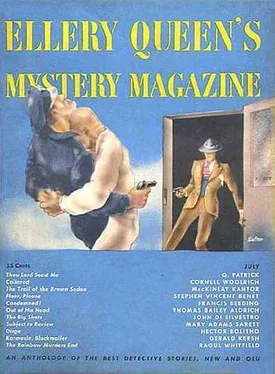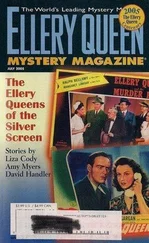Thomas Aldrich - Ellery Queen's Mystery Magazine, Vol. 14, No. 68, July 1949
Здесь есть возможность читать онлайн «Thomas Aldrich - Ellery Queen's Mystery Magazine, Vol. 14, No. 68, July 1949» весь текст электронной книги совершенно бесплатно (целиком полную версию без сокращений). В некоторых случаях можно слушать аудио, скачать через торрент в формате fb2 и присутствует краткое содержание. Город: New York, Год выпуска: 1949, Издательство: The American Mercury, Жанр: Классический детектив, на английском языке. Описание произведения, (предисловие) а так же отзывы посетителей доступны на портале библиотеки ЛибКат.
- Название:Ellery Queen's Mystery Magazine, Vol. 14, No. 68, July 1949
- Автор:
- Издательство:The American Mercury
- Жанр:
- Год:1949
- Город:New York
- ISBN:нет данных
- Рейтинг книги:5 / 5. Голосов: 1
-
Избранное:Добавить в избранное
- Отзывы:
-
Ваша оценка:
- 100
- 1
- 2
- 3
- 4
- 5
Ellery Queen's Mystery Magazine, Vol. 14, No. 68, July 1949: краткое содержание, описание и аннотация
Предлагаем к чтению аннотацию, описание, краткое содержание или предисловие (зависит от того, что написал сам автор книги «Ellery Queen's Mystery Magazine, Vol. 14, No. 68, July 1949»). Если вы не нашли необходимую информацию о книге — напишите в комментариях, мы постараемся отыскать её.
Ellery Queen's Mystery Magazine, Vol. 14, No. 68, July 1949 — читать онлайн бесплатно полную книгу (весь текст) целиком
Ниже представлен текст книги, разбитый по страницам. Система сохранения места последней прочитанной страницы, позволяет с удобством читать онлайн бесплатно книгу «Ellery Queen's Mystery Magazine, Vol. 14, No. 68, July 1949», без необходимости каждый раз заново искать на чём Вы остановились. Поставьте закладку, и сможете в любой момент перейти на страницу, на которой закончили чтение.
Интервал:
Закладка:
Ellery Queen’s Mystery Magazine, Vol. 14, No. 68, July 1949

Thou lord seest me
by Q. Patrick
Q. Patrick has won a prize in all four EQMM contests to date — and may they continue to, ad infinitum. The four prizewinning stories are, from every possible standpoint, a quality quartet — “Witness for the Prosecution,” “Love Comes to. Miss Lucy,” “ Mother, May I Go Out to Swim?” and now, “Thou Lord Seest Me.” Indeed, we wonder seriously if many detective-story writers can match that foursome with short stories produced in the last four years ...
The title of this year’s tale derives, of course, from the Bible. The original wording, in the 16th chapter of Genesis, 13, reads: Thou God seest me. This was a popular text chosen by mailers of Victorian samplers — remember seeing them framed, on parlor tables and on walls? — but for some reason difficult to analyze the sampler-makers could not bring themselves to use the word God. So, it became: Thou Lord Seest Me — and in that form started Q. Patrick on their creative labors.
The more obvious sources of the story are twofold: a trip to England during the war and a brooding on the human need for love. The terrible food shortage in London suggested a plot in which the authors could show how lack of food and the great longing for it can disrupt family life and bring about a whole complex of antagonisms in a society hitherto accustomed, to relative plenty. But this larger theme got sidetracked when the authors noticed an ordinary, shabby, dispirited little office worker getting into a bus to go home; the vision of this little man’s probable home life, with a probably dreary wife, in a probably dreary suburb — and lo, the character of Mr. Loomis was born — the little office worker who craved affection so deeply that ... But we must not tell too much.
In the cauldron of creation the food shortage was mixed in, and the text of the Victorian sampler, and a fantasy of love, and a golden santonin world. Not the Shakespearean brew of eye of newt, and toe of frog, wool of bat, and tongue of dog, but boiling i’ the charmed pot you will find the one ingredient which remains constant — the poison’d seeds of murder ...
The office clock struck five. Mr. Loomis looked up at it and frowned. Mr. Loomis hated and feared five o’clock as most men fear death. And for him it was the death of each day’s life since it meant leaving the office. It was only in the office that Mr. Loomis felt himself a man of stature and importance.
He closed his ledger and with a little sigh carried it over to the safe. He spent as long as he could tidying up his already meticulous desk. He arranged his pencils in a neat row, first vertical then changing them to horizontal; he shuffled his inkpots and next went to fetch his hat and coat. As he appeared from the cloakroom, wearing his old bowler and his black coat with its worn velveteen collar, he looked like any tired little man in post-blitz London. His mustache was frayed like his cuffs; his front teeth needed attention; and he stooped too much for a man of fifty.
His office day was over. Now there remained only the pleasure of saying good night to Miss Henderson. Mr. Loomis hastened his footsteps slightly as, passing downstairs, he saw there was still a light in Mr. Tinker’s office. Rose Henderson was secretary to the president. She was also sales manager and occasionally — for Tinker and Smythe dealt largely in patent medicines for children — Mother’s Service Manager. The latter term was used when she signed letters dealing with the Croup Elixir or the Worm Eliminant which were two of the firm’s best sellers.
“Been kept busy, Miss Henderson?” It was the usual formula repeated almost daily for years.
“So, so, Mr. Loomis. I’m just finishing off a few letters.”
Rose Henderson looked up and smiled, showing almost perfect teeth. Unfortunately they were her only really good feature. Her nose was too wide and behind their rimless glasses, her eyes were too small. Her hair always looked like the nest of a clean but untidy heron. Nevertheless, Mr. Loomis liked her appearance.
In fact, being an incurable romantic, he had been perhaps a shade in love with her for quite a number of years. Oh, it was a perfectly respectable sentiment, for Mr. Loomis was very much a married man. Indeed, he would not have known Miss Henderson’s Christian name had he not, as the firm’s cashier, had to make out a salary check to Rose K. Henderson every month. Sometimes he wondered what the K. stood for.
It had all started with the faded snapshot of herself which Miss Henderson had showed to Mr. Loomis, just for a lark, about ten years ago, at the picnic celebrating Mr. Tinker’s wedding. It portrayed bare-legged little Rosie Henderson at the age of eight, happily sucking a stick of candy rock on the sands of Burnham-on-Sea. Mr. Loomis had purloined this picture shamelessly and kept it face downward in a locked drawer of his desk at home. Occasionally, he took it out and thought to himself how Miss Henderson, who must now be about forty, should by rights be the mother of several little girls who looked just like that. And perhaps he thought that if he and Miss Henderson...
But, no. It must be repeated that Mr. Loomis was married to a most estimable and faithful wife whose lips had never touched liquor, tobacco, or those of any man but her husband.
“Well, good night, Mr. Loomis.”
“Good night, Miss Henderson.”
Mr. Loomis put on his bowler again and passed out into the thick miasma which is Clerkenwell on a January evening. He saw with some satisfaction that there was quite a long queue waiting for the Pimlico bus. With any luck he would miss the first one, possibly the second, and thus delay the ineluctable moment when he would have to knock on his front door and find himself at home.
As he waited, his fingers ran mechanically through his pockets. The contents would have disgraced any self-respecting schoolboy. There were two lumps of sugar, the rock cake (twopence extra) carefully saved from his tea. There was also a cough lozenge, half a biscuit wrapped in an old invoice and two of the firm’s medium-sized manila envelopes. Into one of these Mr. Loomis squeezed his squirrel hoard with some satisfaction, for these fragments were offerings intended for the gratification of his most recently acquired “daughter.”
Mr. Loomis, a father, who had missed his vocation, adored little girls. He had had scores of “daughters” and he had wooed them in scores of different ways. There was blue-eyed Lucy Green of the ringlets whose heart he had won with fretwork toys made secretly in his own tiny workshop. There was short-haired, freckle-faced Belinda Wren (now a mother herself) for whom he had ransacked his wife’s ragbag to make stuffed dolls and teddy bears. There were many others, plain and pretty, whose faces had lit up eagerly at the sight of Daddy “Bloomers.”
His latest love was Dinah Milton who had recently come to live with her mother in the house next door. She was a wisp of a child with an appetite which would have done credit to a regiment of guardsmen. But Mr. Loomis saw her skinny little frame through rosy spectacles for she reminded him a tiny bit — oh, such a tiny bit — of the little girl whose faded snapshot he kept locked in his drawer.
There was something particularly touching about Dinah’s greediness because the shortage of food in England was hard on hungry little girls. An added bond was the fact that Mrs. Loomis disapproved monumentally of the easy-going habits of Dinah’s mother. That she disapproved of Dinah herself went without saying. Mrs. Loomis’ childlessness had not made her sympathetic toward the offspring of others.
Читать дальшеИнтервал:
Закладка:
Похожие книги на «Ellery Queen's Mystery Magazine, Vol. 14, No. 68, July 1949»
Представляем Вашему вниманию похожие книги на «Ellery Queen's Mystery Magazine, Vol. 14, No. 68, July 1949» списком для выбора. Мы отобрали схожую по названию и смыслу литературу в надежде предоставить читателям больше вариантов отыскать новые, интересные, ещё непрочитанные произведения.
Обсуждение, отзывы о книге «Ellery Queen's Mystery Magazine, Vol. 14, No. 68, July 1949» и просто собственные мнения читателей. Оставьте ваши комментарии, напишите, что Вы думаете о произведении, его смысле или главных героях. Укажите что конкретно понравилось, а что нет, и почему Вы так считаете.












